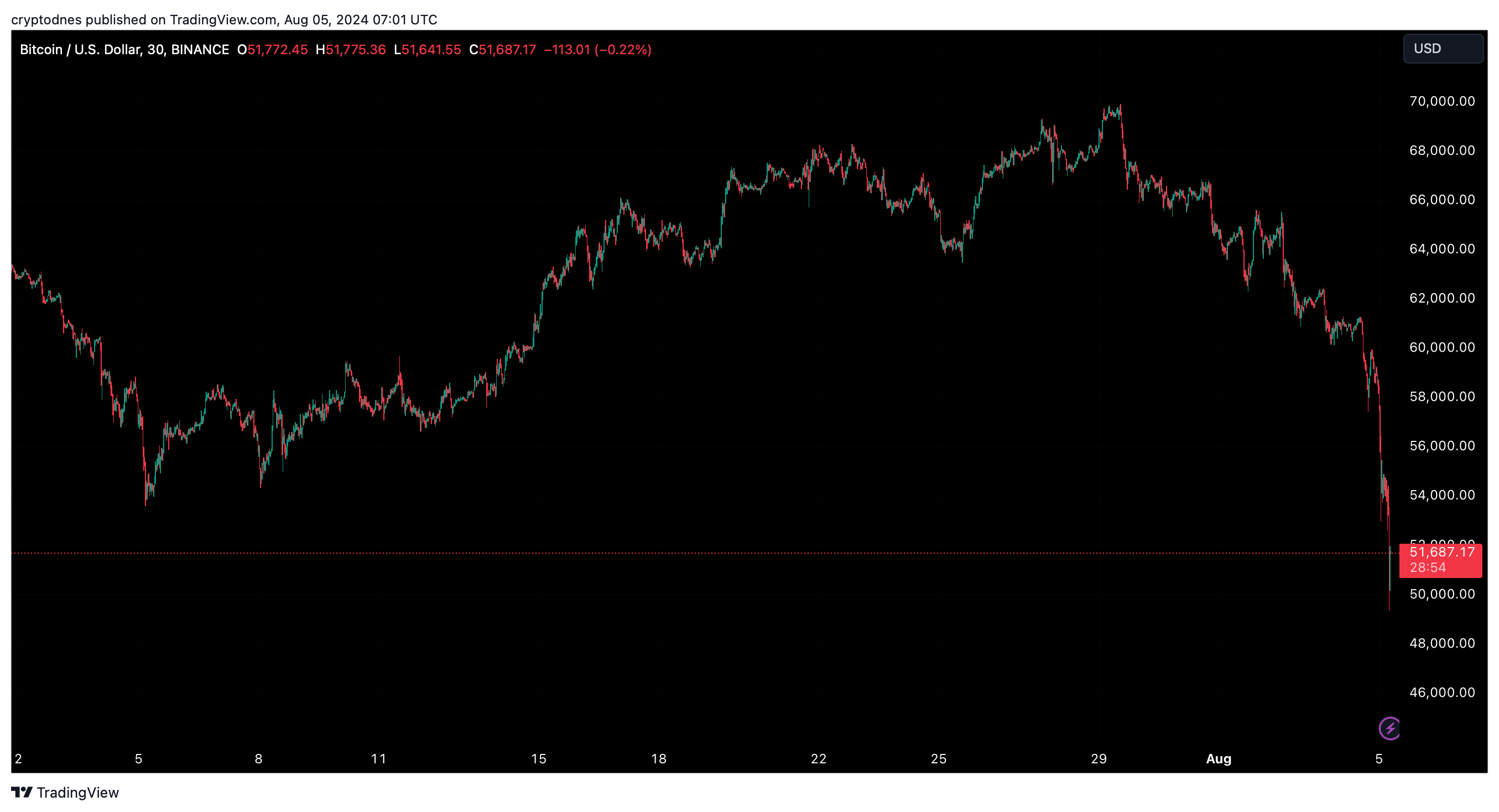Bitcoin Price Crashed Below $50,000
05.08.2024 9:52 2 min. read Alexander Zdravkov
The crypto market saw a significant drop in value as investors continued to abandon high-risk assets.
Bitcoin led the decline with 16% and went below $50,000 in the last 24 hours, while Ethereum plummeted over 23% and at the time of writing is trading at $2,230. According to CoinMarketCap, the total market cap is down 11%. At this point it stands at $1.84 trillion.
This decline in cryptocurrencies has coincided with a broader decline in equity markets in the Asia-Pacific region. Japan’s Nikkei 225 fell 10%, extending losses from the previous week, after the Bank of Japan announced an increase in its benchmark interest rate to a 16-year high.
At the time of writing, the leading cryptocurrency has partially recovered and is trading at $51,900, down 27% in the last week, and its market cap has fallen to around $1 trillion.

It was also reported that $1,000,000,000 was liquidated from the crypto market in the last 24 hours.
The stock market also suffered a decline last week that was related in part to disappointing earnings, a weaker-than-expected jobs report, higher unemployment and a declining manufacturing sector. The U.S. Federal Reserve chose to hold its benchmark interest rate steady and did not promise a September rate cut, which many market experts had included in their forecasts. Lower interest rates usually correlate with better performance of risky assets.
-
1
Blockchain Group Bets Big on Bitcoin With Bold €300M Equity Deal
09.06.2025 22:00 2 min. read -
2
BlackRock’s Bitcoin ETF Breaks Into Top 15 Most Traded ETFs of 2025
12.06.2025 18:00 2 min. read -
3
Bitcoin to Track Global Economy, Not Dollars, Says Crypto Expert
09.06.2025 18:00 2 min. read -
4
Bitcoin on a Path to $1 Million as Wall Street Embraces Digital Gold – Mike Novogratz
14.06.2025 19:00 1 min. read -
5
Bank of America Compares Bitcoin to History’s Most Disruptive Inventions
17.06.2025 14:00 1 min. read
Bitcoin Averages 37% Rebound After Crises, Binance Research Finds
Despite common fears that global crises spell disaster for crypto markets, new data from Binance Research suggests the opposite may be true — at least for Bitcoin.
Bitcoin Mining Faces Profit Crunch, But No Panic Selling
A new report by crypto analytics firm Alphractal reveals that Bitcoin miners are facing some of the lowest profitability levels in over a decade — yet have shown little sign of capitulation.
Bitcoin Hashrate Declines 3.5%, But Miners Hold Firm Amid Market Weakness
Bitcoin’s network hashrate has fallen 3.5% since mid-June, marking the sharpest decline in computing power since July 2024.
Bitcoin Surpasses Alphabet (Google) to Become 6th Most Valuable Asset Globally
Bitcoin has officially overtaken Alphabet (Google’s parent company) in global asset rankings, becoming the sixth most valuable asset in the world, according to the latest real-time market data.
-
1
Blockchain Group Bets Big on Bitcoin With Bold €300M Equity Deal
09.06.2025 22:00 2 min. read -
2
BlackRock’s Bitcoin ETF Breaks Into Top 15 Most Traded ETFs of 2025
12.06.2025 18:00 2 min. read -
3
Bitcoin to Track Global Economy, Not Dollars, Says Crypto Expert
09.06.2025 18:00 2 min. read -
4
Bitcoin on a Path to $1 Million as Wall Street Embraces Digital Gold – Mike Novogratz
14.06.2025 19:00 1 min. read -
5
Bank of America Compares Bitcoin to History’s Most Disruptive Inventions
17.06.2025 14:00 1 min. read

